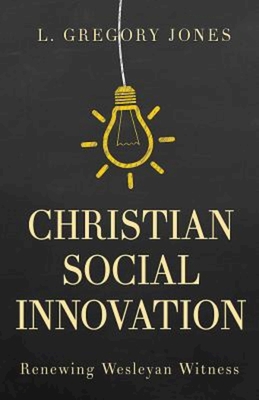Christian Social Innovation: Renewing Wesleyan Witness

Christian Social Innovation: Renewing Wesleyan Witness
Everybody seems interested in innovation and entrepreneurship these days. Start-ups are generating new jobs, creating wealth and providing solutions to longstanding problems. People are also aware that old-line social institutions need innovative approaches that provide renewal, re-establish trust and cultivate sustainability. What do faith communities have to do with innovation and entrepreneurship? Faith communities have their own need for innovation, demonstrated in a growing interest in starting new churches, developing "fresh expressions" for gatherings of community and discussions about how to cultivate a renewed sense of mission. But do faith communities have anything unique to contribute to conversations about innovation and entrepreneurship, especially in "social entrepreneurship"? At first glance, the answer seems to be "no." Burgeoning literature on social entrepreneurship barely mentions the church or other faith-based institutions -- and when it does they're often described as part of the broken institutional landscape. Recently much of the most innovative and entrepreneurial work in these sectors has been done apart from faith communities, whether through secular non-governmental organizations (e.g., Teach for America, Knowledge is Power Program schools) or for-profit businesses (e.g., hospitals and hospices). Indeed, it is now often assumed that faith and faith communities either are irrelevant to social innovation and entrepreneurship or are a significant obstacle. We believe too many people in faith communities, and faith-based organizations themselves, turned inward. They became preoccupied with managing what already existed rather than focusing on innovative renewal of their organizations and entrepreneurial approaches to starting new ones. However, Christian social innovation, at its best, depends on a conception of hope different than the optimism that often characterizes secular endeavors, a hope that acknowledges personal and social brokenness. Further, faith communities, at their best, have embodied perseverance, often bringing people together across generations and diverse sectors to imagine how common effort and faith might overcome obstacles. Although some faith communities have lost the "at-their-best" focus, new conversations and experiments are emerging beyond the goal of starting new congregations. But they tend to be "and" conversations: faith and innovation, faith and entrepreneurship, faith and leadership. We don't thi
PRP: 117.74 Lei
Acesta este Prețul Recomandat de Producător. Prețul de vânzare al produsului este afișat mai jos.
105.97Lei
105.97Lei
117.74 LeiLivrare in 2-4 saptamani
Descrierea produsului
Everybody seems interested in innovation and entrepreneurship these days. Start-ups are generating new jobs, creating wealth and providing solutions to longstanding problems. People are also aware that old-line social institutions need innovative approaches that provide renewal, re-establish trust and cultivate sustainability. What do faith communities have to do with innovation and entrepreneurship? Faith communities have their own need for innovation, demonstrated in a growing interest in starting new churches, developing "fresh expressions" for gatherings of community and discussions about how to cultivate a renewed sense of mission. But do faith communities have anything unique to contribute to conversations about innovation and entrepreneurship, especially in "social entrepreneurship"? At first glance, the answer seems to be "no." Burgeoning literature on social entrepreneurship barely mentions the church or other faith-based institutions -- and when it does they're often described as part of the broken institutional landscape. Recently much of the most innovative and entrepreneurial work in these sectors has been done apart from faith communities, whether through secular non-governmental organizations (e.g., Teach for America, Knowledge is Power Program schools) or for-profit businesses (e.g., hospitals and hospices). Indeed, it is now often assumed that faith and faith communities either are irrelevant to social innovation and entrepreneurship or are a significant obstacle. We believe too many people in faith communities, and faith-based organizations themselves, turned inward. They became preoccupied with managing what already existed rather than focusing on innovative renewal of their organizations and entrepreneurial approaches to starting new ones. However, Christian social innovation, at its best, depends on a conception of hope different than the optimism that often characterizes secular endeavors, a hope that acknowledges personal and social brokenness. Further, faith communities, at their best, have embodied perseverance, often bringing people together across generations and diverse sectors to imagine how common effort and faith might overcome obstacles. Although some faith communities have lost the "at-their-best" focus, new conversations and experiments are emerging beyond the goal of starting new congregations. But they tend to be "and" conversations: faith and innovation, faith and entrepreneurship, faith and leadership. We don't thi
Detaliile produsului











